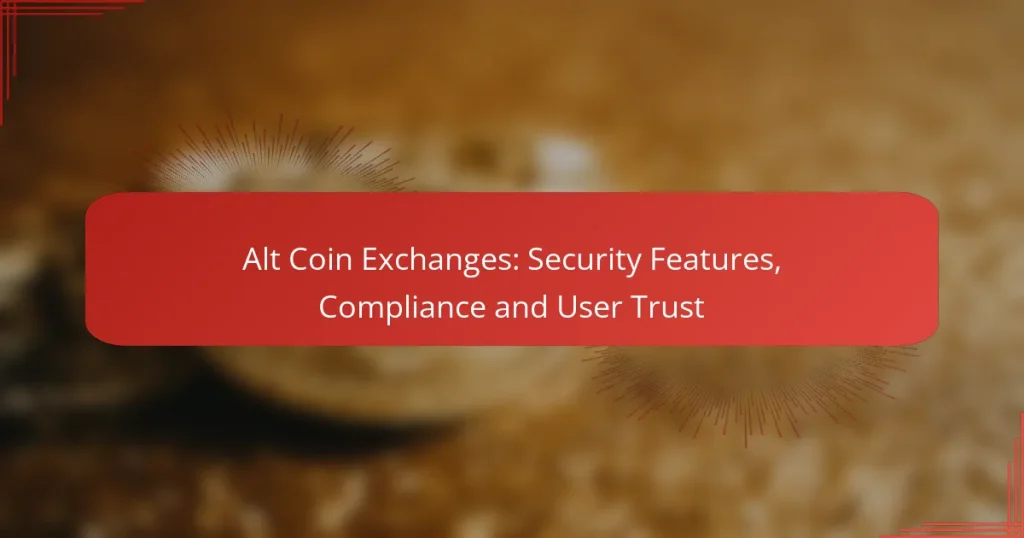Altcoin exchanges play a crucial role in the cryptocurrency ecosystem by implementing robust security features to safeguard user funds and data. These measures, including two-factor authentication and cold storage, are complemented by compliance with regulations such as KYC and AML, which further enhance user trust. As the reputation of these exchanges significantly impacts user decisions and market stability, maintaining high security and compliance standards is essential for their success.
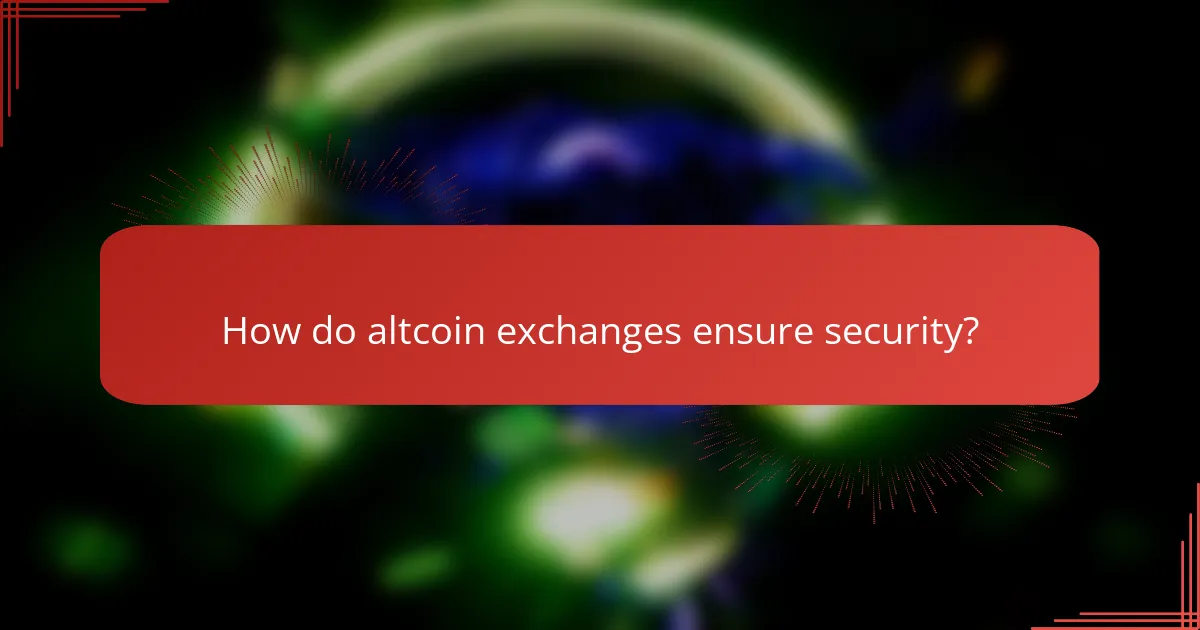
How do altcoin exchanges ensure security?
Altcoin exchanges implement various security measures to protect user funds and data. These features include two-factor authentication, cold storage of assets, regular security audits, and encryption protocols, all aimed at enhancing user trust and compliance with regulations.
Two-factor authentication
Two-factor authentication (2FA) adds an extra layer of security by requiring users to provide two forms of identification before accessing their accounts. Typically, this involves something the user knows, like a password, and something the user has, such as a mobile device that generates a time-sensitive code.
Exchanges may offer different 2FA methods, including SMS codes, authenticator apps, or hardware tokens. Users should enable 2FA to significantly reduce the risk of unauthorized access to their accounts.
Cold storage of assets
Cold storage refers to keeping the majority of a cryptocurrency exchange’s assets offline, away from potential online threats. This method protects funds from hacking attempts, as offline wallets are not directly accessible via the internet.
Exchanges often use a combination of hot wallets for daily transactions and cold wallets for long-term storage. A good practice is to ensure that exchanges disclose their cold storage policies and the percentage of assets held offline.
Regular security audits
Regular security audits involve third-party assessments of an exchange’s systems and protocols to identify vulnerabilities. These audits help ensure compliance with industry standards and enhance the overall security posture of the platform.
Users should look for exchanges that publish audit reports or summaries, as this transparency can indicate a commitment to security. Additionally, ongoing audits demonstrate that the exchange is proactive in addressing potential threats.
Encryption protocols
Encryption protocols protect user data by converting it into a secure format that can only be read with the appropriate decryption key. Most reputable exchanges use advanced encryption standards to safeguard sensitive information, such as passwords and personal details.
When selecting an exchange, verify that it employs strong encryption methods, such as AES-256, and check for HTTPS in the website URL. This ensures that data transmitted between users and the exchange remains confidential and secure.
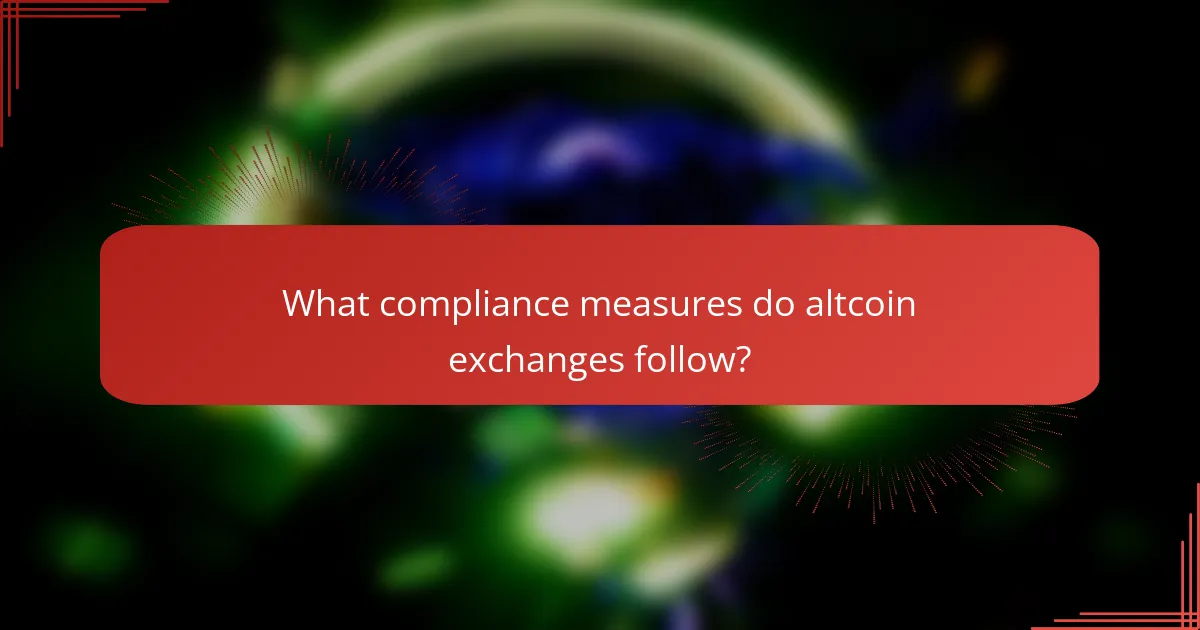
What compliance measures do altcoin exchanges follow?
Altcoin exchanges adhere to various compliance measures to ensure security and build user trust. These measures typically include Know Your Customer (KYC) regulations, Anti-Money Laundering (AML) policies, and adherence to data protection laws like the General Data Protection Regulation (GDPR).
KYC regulations
KYC regulations require altcoin exchanges to verify the identities of their users. This process often involves collecting personal information such as name, address, and identification documents. By implementing KYC, exchanges can reduce the risk of fraud and ensure that users are not engaging in illegal activities.
Exchanges may use third-party services to streamline the KYC process, allowing for quicker verification times, typically ranging from a few minutes to several hours. Users should be prepared to provide accurate information to avoid delays.
AML policies
Anti-Money Laundering (AML) policies are designed to prevent financial crimes within altcoin exchanges. These policies require exchanges to monitor transactions for suspicious activity and report any findings to relevant authorities. Compliance with AML regulations helps maintain the integrity of the financial system.
Exchanges often implement automated systems to flag unusual transaction patterns, such as large deposits or withdrawals that deviate from a user’s typical behavior. Users should be aware that such monitoring may lead to additional scrutiny of their accounts.
GDPR adherence
GDPR adherence is crucial for altcoin exchanges operating in or serving users in the European Union. This regulation mandates that exchanges protect user data and provide transparency regarding data collection and processing. Compliance ensures that users have control over their personal information.
Exchanges must implement robust data protection measures, including encryption and secure storage, to safeguard user data. Users should review the privacy policies of exchanges to understand how their data will be used and their rights under GDPR.
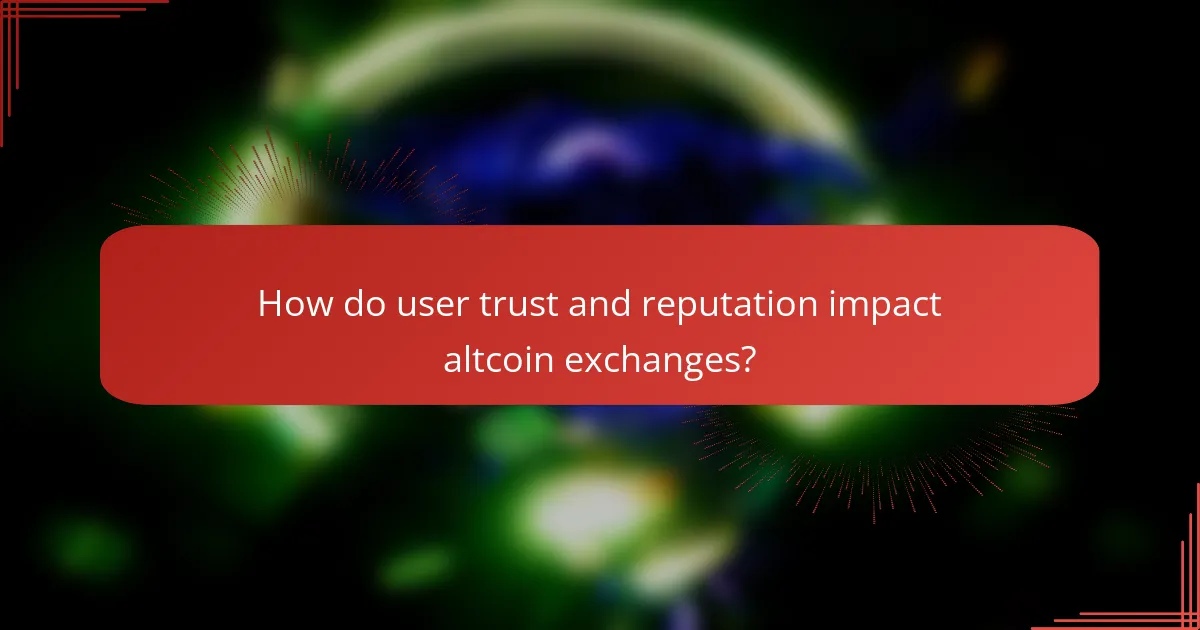
How do user trust and reputation impact altcoin exchanges?
User trust and reputation are critical for altcoin exchanges as they influence user decisions and overall market stability. A strong reputation can attract more users, while negative perceptions can lead to decreased trading volumes and potential regulatory scrutiny.
User reviews and ratings
User reviews and ratings provide insight into the experiences of other traders on an altcoin exchange. High ratings often correlate with better security measures, customer support, and user-friendly interfaces. Prospective users should look for exchanges with consistently positive feedback and a strong community presence.
Platforms like Trustpilot or specialized cryptocurrency forums can be valuable resources for assessing user sentiment. Pay attention to the volume of reviews as well; a large number of reviews can indicate a more reliable consensus than a few isolated opinions.
Transparency in operations
Transparency in operations is essential for building user trust in altcoin exchanges. Exchanges that openly share information about their security protocols, fee structures, and operational practices tend to foster greater confidence among users. Look for exchanges that publish regular reports or updates regarding their financial health and security measures.
Additionally, clear communication about changes in policies or fees can enhance trust. Users should be cautious of exchanges that lack transparency, as this can be a red flag indicating potential issues.
Response to security incidents
The way an altcoin exchange responds to security incidents significantly affects user trust. Quick and effective communication during a breach, along with transparent steps taken to resolve the issue, can help maintain user confidence. Exchanges that offer compensation or insurance for affected users often retain a loyal customer base.
Users should evaluate an exchange’s history of security incidents and their responses. A proactive approach to security, including regular audits and updates, is a good indicator of a trustworthy platform. Always check for an exchange’s incident response policy before committing funds.
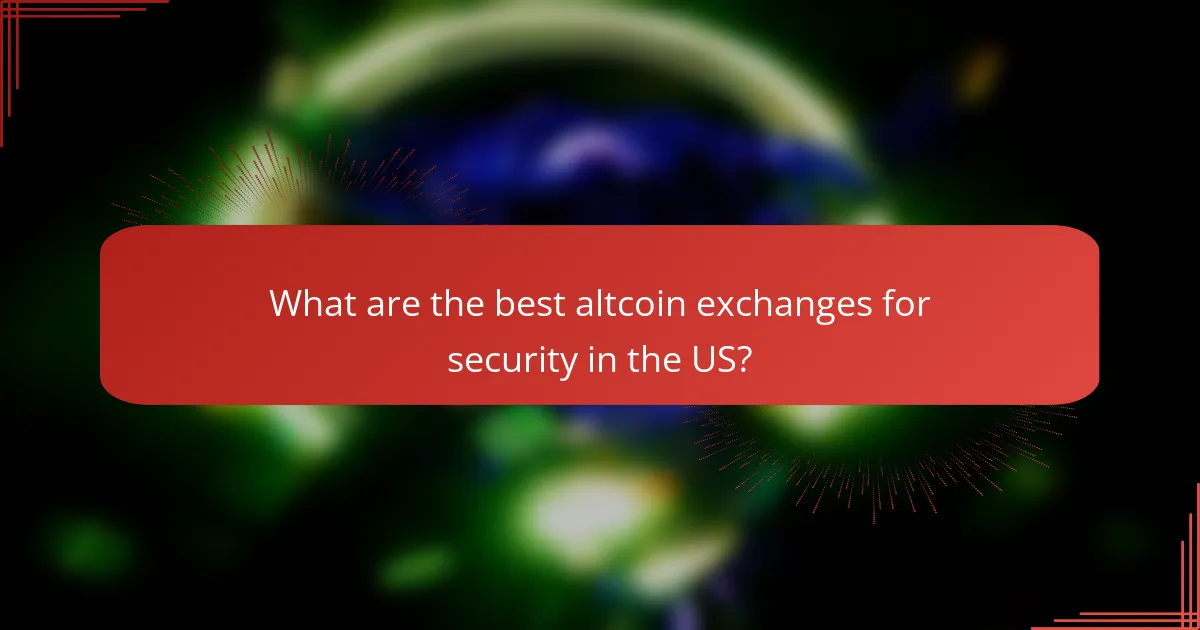
What are the best altcoin exchanges for security in the US?
The best altcoin exchanges for security in the US prioritize robust security measures, regulatory compliance, and user trust. Key players include Coinbase, Binance US, and Kraken, each offering unique features to enhance user safety and protect assets.
Coinbase
Coinbase is known for its strong security protocols, including two-factor authentication (2FA) and insurance coverage for digital assets stored on their platform. They comply with US regulations, ensuring a level of trust among users.
Additionally, Coinbase stores the majority of user funds in cold storage, which significantly reduces the risk of hacking. Users can also set up withdrawal whitelists to further enhance security.
Binance US
Binance US offers a secure trading environment with features like 2FA and withdrawal address whitelisting. The platform adheres to US regulatory standards, which helps build user confidence in its operations.
Moreover, Binance US employs advanced security measures, including regular security audits and a dedicated security team. Users should take advantage of these features to safeguard their accounts effectively.
Kraken
Kraken is recognized for its high-security standards, including 2FA, PGP encryption for email communications, and a comprehensive security audit process. The exchange is compliant with US regulations, which adds to its credibility.
Kraken also offers a unique feature called “Kraken Security Labs,” which focuses on continuous improvement of their security measures. Users are encouraged to utilize all available security features to protect their investments.

What features enhance user trust in altcoin exchanges?
User trust in altcoin exchanges is significantly bolstered by robust security features, transparent practices, and regulatory compliance. Key elements such as insurance on deposits and clear fee structures play a crucial role in establishing confidence among users.
Insurance on deposits
Insurance on deposits protects users’ funds in the event of a security breach or operational failure. Many reputable exchanges offer insurance policies that cover a portion of user assets, providing an added layer of security.
When choosing an exchange, look for those that explicitly state their insurance coverage and the specific circumstances under which it applies. For instance, some exchanges may cover losses due to hacking, while others might not include certain types of fraud.
Clear fee structures
Clear fee structures help users understand the costs associated with trading on an exchange. Transparent pricing eliminates confusion and builds trust, as users can easily calculate potential expenses before making transactions.
Exchanges should provide detailed information on trading fees, withdrawal fees, and any other applicable charges. Look for platforms that offer a simple fee schedule, ideally with no hidden fees, to ensure you know exactly what you are paying for each transaction.
